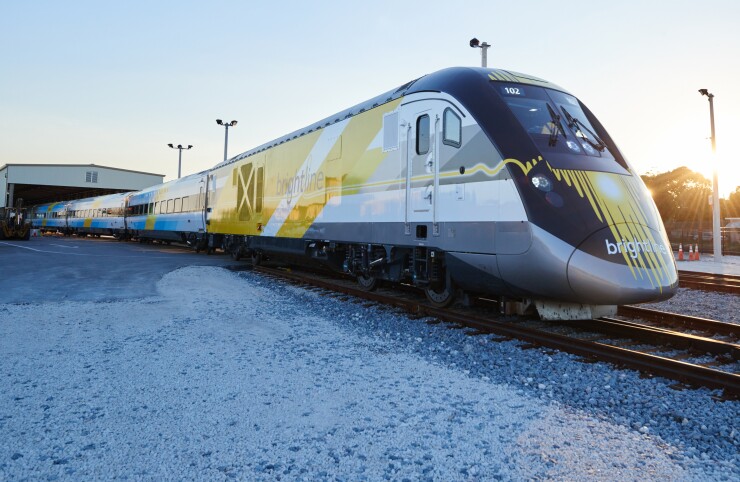The U.S. Supreme Court denied Indian River County, Florida's request for a writ of certiorari, ending a years-long legal battle by the county to stop construction of the privately owned Brightline passenger train project.
The high court's order list, released Monday, denied nearly 1,000 requests for writs, including the county's, the $200,000 cost of which was paid by local residents and activists.
The county had asked justices to overturn a December 2019 appellate court decision that supported the U.S. Department of Transportation's decision to approve private-activity bond financing for Brightline, formerly known as Virgin Trains USA. Denying the writ means the appellate ruling stands and the bonds can be used.

The federal legal challenge is now over, said Indian River County Attorney Dylan Reingold.
"Our outside counsel prepared an excellent and compelling brief, but as you know the Supreme Court declined to take jurisdiction," Reingold said Tuesday. "It was disappointing, but not a surprise."
Reingold said he believed the county had "meritorious claims" in its case, but petitions for writs of certiorari are rarely granted.
The USDOT authorized three separate PAB allocations totaling $2.7 billion for the Brightline project. The bonds were sold by conduit issuer Florida Development Finance Corp. on behalf of the train owners.
“The Supreme Court’s decision to deny Indian River’s petition closes out the county’s repeated and baseless attempt to disrupt our efforts of connecting Florida by passenger rail," said Brightline spokesman Ben Porritt. "We continue to explore locations for a Brightline station in the Treasure Coast and are encouraged by the tremendous amounts of support we have received in the region.”
The Treasure Coast includes Indian River, St. Lucie and Martin counties on Florida's east coast.
The Indian River County Commission, which has spent nearly $4 million on litigation over some six years, fought the train project over safety issues due to the fact that 32 daily passenger trains will run at speeds up to 110 mph through many small downtowns where tracks are close to local roads and stores.
Currently, there is no plan for the train to stop in the county.
Reingold thanked residents who contributed to the cost of filing the Supreme Court briefs, and he noted the contribution of Michael Luttig in helping to prepare legal briefs. Luttig is a former federal judge of the United States Court of Appeals for the Fourth Circuit.
Susan Mehiel, spokeswoman with the nonprofit Alliance for Safe Trains advocacy group and an opponent of the Brightline, said there are still safety concerns about the project.
"Brightline’s lack of funding to implement adequate safeguards such as fencing near churches, schools and youth facilities continues to concern us," she said. "We also await progress on the legal challenge to the USDOT’s new rule allowing highly volatile liquefied natural gas on the densely populated [Florida east coast] corridor."
In April 2019, the Trump administration issued an executive order directing the Pipeline and Hazardous Materials Safety Administration to conduct rulemaking that would allow LNG to be transported by rail. The rule became final in August.
Earthjustice filed a legal challenge of the rule on behalf of several nonprofit groups in the United States Court of Appeals for the District of Columbia.
Florida East Coast Railway operates on a 351-mile track from Jacksonville to Miami, along the state's east coast. Brightline will share the rail line with FECR, where the passenger train could come in close contact with the transport of LNG, Mehiel said.
While it lost the federal case, Indian River County is continuing to press a lawsuit in the Circuit Court for Duval County where FECR is based.
In January 2019, the county sued Brightline and FECR asking a judge to determine who is liable for funding railroad crossing improvements needed for the passenger train.
The lawsuit will determine if the train’s private owners can benefit from the county’s 31 at-grade highway crossing agreements with FECR, which granted Brightline an easement to use its tracks.
The county said in its filing that it hasn’t agreed to make any changes in its crossing agreements that would allow Brightline to use the tracks. Reingold said Tuesday the state court case is in pre-trial discovery.
On March 25, Brightline suspended service between West Palm Beach and Miami due to the coronavirus pandemic, and hasn't said when it will resume.
The company continues to work on expanding the project from West Palm Beach to Orlando. An August construction report said more than 875 construction workers are on the job.
"Our planned expansion to Orlando is nearly 50% complete and people are excited about an eco-friendly, car-free option to travel," Brightline's Porritt said.





